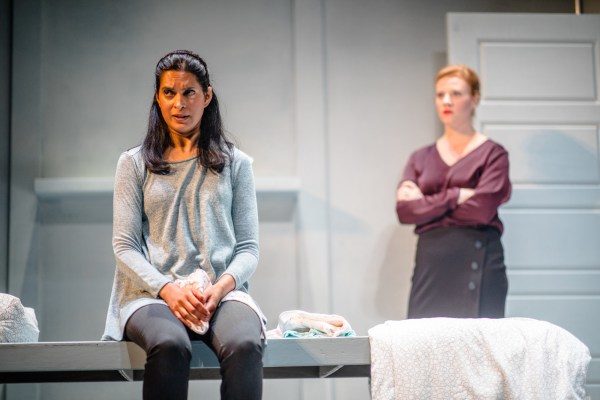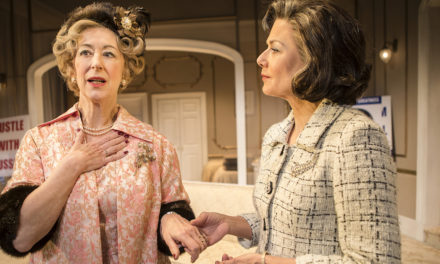Montreal, Québec
Sarah J Culkin reviews Imago Theatre’s production of Other People’s Children by Hannah Moscovitch:
Little is often said about the so-called “fourth trimester” of pregnancy–the initial adjustment period after bringing home baby, where parents must adapt to a volley of new feelings, experiences, and challenges with little in the way of dedicated support. Mothers are additionally going through a number of physical and hormonal adjustments and contending with impossibly contradictory messages about being a perfect mother, a working woman, and a domestic diva.
It is out of this dynamic that the action of Other People’s Children unfolds onstage, an engrossing drama by Hannah Moscovitch, wherein a young, wealthy, white couple decides to hire a live-in nanny for their 4-month-old daughter.
Within the first scene, we establish that new mother Ilana (Kathleen Stavert) is uneasily juggling her career as a lawyer and her difficulties in adjusting to motherhood (later revealed to be postpartum depression), and that Ben (Brett Donahue) is happy to offer his unsolicited opinions without actually doing much to adapt to his new role as a parent. Into this tenuously balanced relationship, Sati (Asha Vijayasingham) is introduced, a Sri Lankan woman with an engineering degree, and four kids back home, who is moving into one of the young couple’s (many?) spare rooms to look after their daughter full-time.
The drama comes from the pressurized contents of this nuclear family becoming unbalanced by the addition of a third person engaged in the intimate act of caretaking. Moscovitch’s adept and naturalistic writing opens an uncomfortable can of worms onstage as privilege and unchecked emotion interact with the unregulated childcare industry to open wounds, expose secrets, and bring every character to a breaking point.
The elegant set design by Diana Uribe features a modernist glass and chrome master bathroom and a sparse bedroom where Sati stays, somehow creating space that is both playable and increasingly claustrophobic. Vijayasingham, Donahue, and Stavert deliver meticulous physical performances, playing clearly with power dynamics in the space and saying a lot with proximity.
Ilana and Ben are seen to struggle with how to feel about Sati (is she a family member? Employee? Threat?), visibly trying to figure out if they are bad parents for outsourcing care labor, and if their daughter will love Sati more than them. Ilana alternates wildly in her behavior between treating Sati like a confidant and as a physical reminder of Ilana’s own perceived maternal shortcomings. Sati, in her own right, is persistently engaged in testing the boundaries imposed on her until she finally crosses a line, knowing that she could jeopardize her permanent residence candidacy. The tension onstage becomes palpable as all three characters negotiate their overlapping roles in the home, and what they owe each other.
The further the play progresses, the more I find myself thinking, “People aren’t like this, are they?” There is a bottleneck effect onstage as the action reaches a fever pitch, with the characters having to flatten themselves into near-caricatures in order to pass through the narrative with all their puny sorrows. The raw emotional life triggered by invisible lines between intimate act and service paid for, however, and the cracks it exposes in the foundation of a family unit already under strain, is nothing short of extreme.
A nuanced political piece such as this should arguably leave the audience with more questions than answers–in Other People’s Children, we are left with one huge question: what kind of broken scale we are indulging when we weigh the comfort of one deeply privileged couple against the career, boundaries, permanent residency, and bodily safety of a migrant caregiver? How can such a broken scale be balanced?
This article appeared in Alt Theatre on November 27, 2018, and has been reposted with permission.
This post was written by the author in their personal capacity.The opinions expressed in this article are the author’s own and do not reflect the view of The Theatre Times, their staff or collaborators.
This post was written by Sarah J Culkin.
The views expressed here belong to the author and do not necessarily reflect our views and opinions.


















